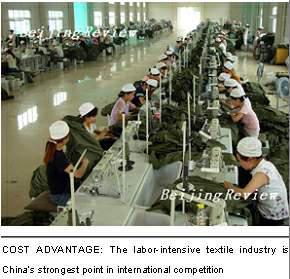Cheap Labor
2006-12-11FENGJIANHUA
FENG JIANHUA

A low-cost work force has helped to drive Chinas economic growth for some time. But as salaries rise, can the momentum be sustained?
“The price advantage of the Chinese labor force will disappear in five to eight years,” said Hua Ruxing, professor at the School of Economics and Management of Tsinghua University, in a recent speech. His comments were widely quoted by the media as confirmation of the view that China is losing its labor cost competitiveness.
In fact, this view originated from a report released by a foreign research institution in late 2005. An analysis by Germanys Nuremberg Research Center predicted that Chinas labor cost advantage could only last three to five years.
An important reason the Chinese economy has maintained its rapid growth is the abundance of inexpensive laborers who have basic work skills. This factor has been cited by some local governments to attract foreign investment. Hence, many people worry about the development of the Chinese economy once such an advantage disappears.
This idea has been taken up by some economists as well, who agree wages are an important component of labor costs. Li Jiange, Deputy Director of the Development Research Center of the State Council, noted at an international seminar that an improvement in workers salaries should be in line with an enterprises ability to bear such an increase. If salary levels are raised too much, investors will transfer their investments to neighboring low-wage countries such as Viet Nam, costing Chinese workers their jobs, he warned.
Although Lis remarks have been accused by opponents of trying to achieve high economic growth by sacrificing workers benefits, some argue his concern is necessary and reasonable in certain respects.
Guangdong Millennium Group Ltd. is a manufacturer for U.S.-based Nike Inc. For many years, most of the Nike footwear sold in the Chinese market were produced by Millennium. However, since the beginning of this year, Nike has transferred many of its orders to Viet Nam. It has also begun to expand its four production lines there and invested more than $16 million to build a new plant. It is reported the sportswear giant plans to make Viet Nam its largest overseas production base by the end of 2007.
A major reason that Nike is withdrawing its production base from China is that the cost of labor in Viet Nam is much lower than in China, according to sources familiar with the situation.
For many years, a cheap labor force has been the main reason that Chinese products have enjoyed a competitive advantage in the international market. However, in recent years, Chinese labor costs have shown a steady increase, especially in coastal provinces and big cities.
Foreign corporations that have invested in China feel the impact of those rising costs directly. Statistics from Japans Unix Electronics Co. Ltd. show, when the company invested in a factory in Shenzhen in 1992, the average salary of its workers was about 8,000 yen ($67) a month, but that has risen to 18,000 yen ($150) this year. Despite the increase, fewer candidates apply for vacancies in the factory than several years ago.
